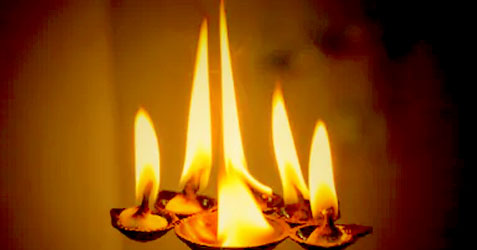


Aarti, also spelled arti, arathi, aarthi, arati or arthi is a Hindu ritual, in which light from wicks soaked in ghee (purified butter) or camphor is offered to one or more deities. Aarti also refers to the songs sung in praise of the deity, when offering of lamps is being offered.
Aarti are Hindi prayer songs, which is sung in a chorus, to address god and goddess with the waving of lamps before gods. The Hindu ritual of aarti is derived from the ancient Vedic concept of fire ceremony which is referred to as the “homa”. The word “aarti” can be broken up into two words in Sanskrit “aa” means “towards or to” and “rati” means “right or virtue or the highest love for god”.
Aarti is performed in all auspicious occasions. Aarti is generally performed one to five times daily and usually at the end of a puja or bhajan session. It is performed during almost all Hindu ceremonies and occasions. It involves the circulating of an 'Aarti plate' around a person or deity and is generally accompanied by the singing of songs in praise of that deva or person (many versions exist). In doing so, the plate itself is supposed to acquire the power of the deity. The priest circulates the plate to all those present. They cup their down-turned hands over the flame and then raise their palms to their forehead - the purificatory blessing, passed from the deva's image to the flame, have now been passed to the devotee.
In India aarti is also performed in several occasions among people of high status, little kids ceremonies, on people embarking or returning to home from a long journey, or a newly married couple when they enter the house for the first time, in front of a person either as a welcome gesture or towards off bad influences of him. Meanwhile this ritual is performed for destroying the bad evils and bad omens.
The aarti plate is generally made of metal, usually silver, bronze or copper. On it must repose a lamp made of kneaded flour, mud or metal, filled with oil or ghee. A cotton wick is put into the oil and then lighted, or camphor is burnt instead. The plate also contains flowers, incense and akshata.
The purpose of performing aarti is the waving of lighted wicks before the deities in a spirit of humility and gratitude, wherein faithful followers become immersed in God's divine form. It symbolises the five elements:
Space (Akash)
Wind (Vayu)
Light (Tej)
Water (Jal), and
Earth (Pruthvi).
Communal Aarti is performed in the mandir; however, devotees also perform it in their homes.